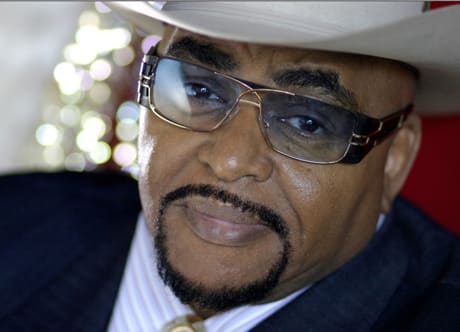Solomon Burke, a true larger-than-life figure in the world of soul music, died early Sunday (October 10) at the age of 70. According to a statement on his official website, Burke passed away of natural causes upon arrival at Amsterdam's Schipol Airport. Burke was scheduled to perform at the city's Club Paradiso with Dutch band De Dijk. They had recently collaborated on the album Hold on Tight.
It was just the latest addition to Burke's immense catalogue, established in 1962 with his first smash single, "Just out of Reach." He consolidated his status with a string of follow-up hits for Atlantic Records, including "Cry to Me," "If You Need Me," and "Everybody Needs Somebody to Love." These songs became part of the early repertoire of the Rolling Stones and other British groups, bringing Burke to the attention of young white audiences.
Burke began being billed as "the King of Rock & Soul," but his fondness for country music was also a major contributor to his career's longevity. He is credited even more widely than Ray Charles for first combining country and soul.
It seemed Burke was destined for greatness from birth, at least according to his grandmother, whom he later described as "powerful spiritual medium." Along with her influence, Burke's early life in his hometown of Philadelphia revolved around his church and its music. He gave his first sermon at age seven, was ordained as a minister at 12 and became a bishop at 21.
He cut his first single at age 14 for a small independent label, which brought him to the attention of Atlantic, then arguably the world's leading R&B label. He remained there until the end of the 1960s, and for the next several decades after he recorded for scores of other labels. Unlike other early soul stars, Burke appeared to manage his life offstage successfully, something that was necessary when his record sales dropped dramatically in the '80s and '90s. Aside from running his L.A.-based church, he also owned a funeral parlor and a limousine service.
However, in 2001 Anti- Records president Andy Kaulkin offered Burke a deal, and the result was the acclaimed album Don't Give up on Me, featuring songs from Tom Waits, Bob Dylan, Van Morrison and Elvis Costello. As Burke told Exclaim! in a 2007 interview, "The label did exactly what it said it would do, and I ended up with my first and only Grammy, and my first real royalty cheque after being in the business for five decades. Isn't that amazing?"
That momentum kept Burke recording and touring steadily from then on, and even though his 500-pound frame needed to rest in a custom-built throne when he performed, his voice never lost any of its power to raise spirits. Along with the De Dijk collaboration, this year he also released Nothing's Impossible, produced by Memphis soul legend Willie Mitchell.
Burke is survived by 21 children and over 100 grandchildren and great-grandchildren.
It was just the latest addition to Burke's immense catalogue, established in 1962 with his first smash single, "Just out of Reach." He consolidated his status with a string of follow-up hits for Atlantic Records, including "Cry to Me," "If You Need Me," and "Everybody Needs Somebody to Love." These songs became part of the early repertoire of the Rolling Stones and other British groups, bringing Burke to the attention of young white audiences.
Burke began being billed as "the King of Rock & Soul," but his fondness for country music was also a major contributor to his career's longevity. He is credited even more widely than Ray Charles for first combining country and soul.
It seemed Burke was destined for greatness from birth, at least according to his grandmother, whom he later described as "powerful spiritual medium." Along with her influence, Burke's early life in his hometown of Philadelphia revolved around his church and its music. He gave his first sermon at age seven, was ordained as a minister at 12 and became a bishop at 21.
He cut his first single at age 14 for a small independent label, which brought him to the attention of Atlantic, then arguably the world's leading R&B label. He remained there until the end of the 1960s, and for the next several decades after he recorded for scores of other labels. Unlike other early soul stars, Burke appeared to manage his life offstage successfully, something that was necessary when his record sales dropped dramatically in the '80s and '90s. Aside from running his L.A.-based church, he also owned a funeral parlor and a limousine service.
However, in 2001 Anti- Records president Andy Kaulkin offered Burke a deal, and the result was the acclaimed album Don't Give up on Me, featuring songs from Tom Waits, Bob Dylan, Van Morrison and Elvis Costello. As Burke told Exclaim! in a 2007 interview, "The label did exactly what it said it would do, and I ended up with my first and only Grammy, and my first real royalty cheque after being in the business for five decades. Isn't that amazing?"
That momentum kept Burke recording and touring steadily from then on, and even though his 500-pound frame needed to rest in a custom-built throne when he performed, his voice never lost any of its power to raise spirits. Along with the De Dijk collaboration, this year he also released Nothing's Impossible, produced by Memphis soul legend Willie Mitchell.
Burke is survived by 21 children and over 100 grandchildren and great-grandchildren.
